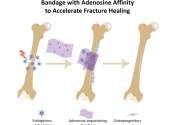One quarter of bacterial pathogens can spread antibiotic resistance directly to peers
Biomedical engineers at Duke University have demonstrated that at least 25 percent of antibiotic-resistant pathogenic bacteria found in clinical settings are capable of spreading their resistance directly to other bacteria. ...









